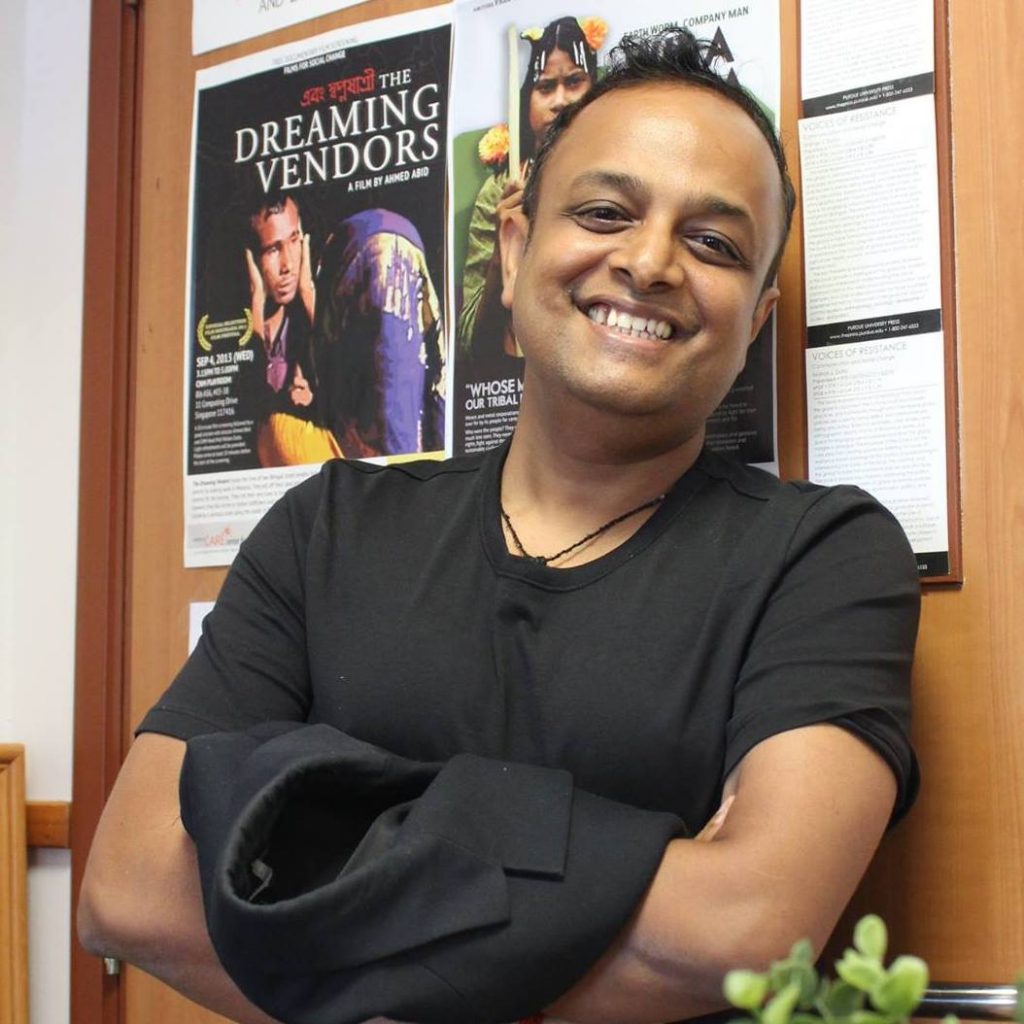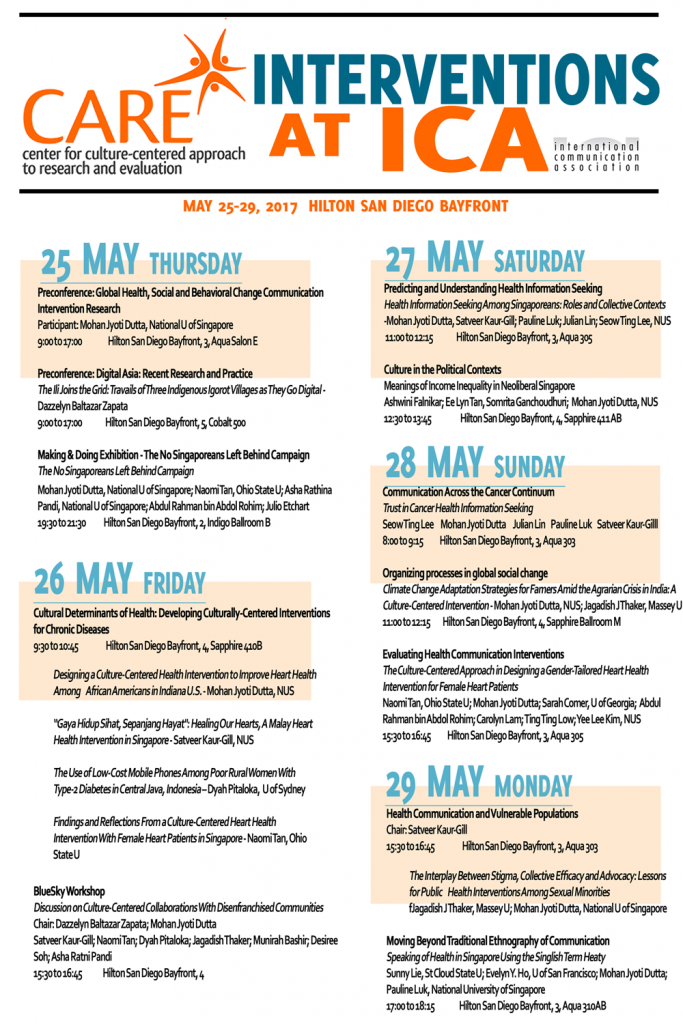
ICA Bluesky Workshop: Discussion Group on Culture-Centred Collaborations With Disenfranchised Communities
Many communicative interventions are exceedingly top-down wherein organisations already have a standard formula of intervention to achieve desired outcomes. Often, these interventions are intrusive to a community’s culture and does nothing more than provide temporary solace, if at all.
The ICA Bluesky Workshop is all about community-driven interventions that put community members and their needs front and centre. The workshop attempts to answer two important questions:
- What does it mean when a community and their culture is in direct dialogue with the intervention that is supposed to transform their lives?
- What does a culture-centred intervention look like?
We invite scholars, activists and practitioners who are involved in similar projects to have a fruitful and learning workshop with us on 26 May, 15:30 – 16:45, at Hilton San Diego Bayfront.
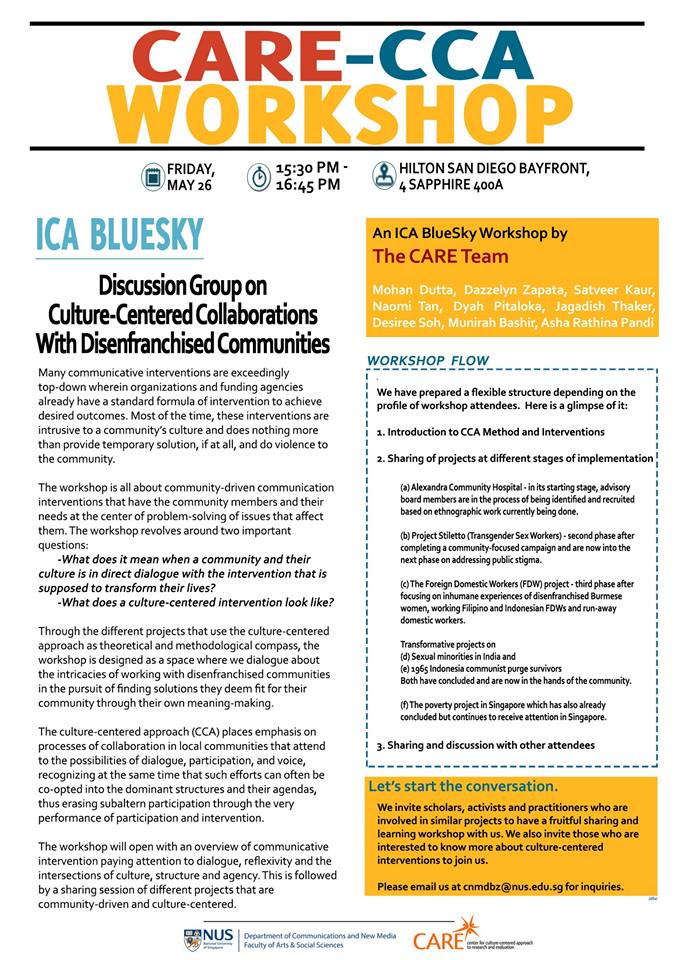
Prof. Mohan J. Dutta presents at the National Communication Association 102nd Annual Convention in Philadelphia, Pennsylvania
NCA Opening Session: Putting Bodies on the Line and Words into Action – Celebrating the Joys of, Challenges in, and Opportunities for Civic Engagement
Chair
Lisa A. Flores, University of Colorado, Boulder – Contact Me
Presenter(s)
Bryant Keith Alexander, Loyola Marymount University – Contact Me Mohan Dutta, National University of Singapore – Contact Me Billie Murray, Villanova University – Contact Me
Sponsor/Co-Sponsors
“Food Insecurity in Singapore: The Communicative (Dis)Value of the Lived Experiences of the Poor”
“Food Insecurity in Singapore: The Communicative (Dis)Value of the Lived Experiences of the Poor” – This journal article co-authored with Naomi Tan, Satveer Kaur, Prof Mohan Dutta, and Nina Venkataraman just got published in the Health Communication! Here is a link for 50 free downloads. Link:http://www.tandfonline.com/doi/full/10.1080/10410236.2016.1196416 Abstract: “Food insecurity is a form of health disparity that results in adverse health outcomes, particularly among disenfranchised and vulnerable populations. Using the culture-centered approach, this article engages with issues of food insecurity, health, and poverty among the low-income community in Singapore. Through 30 in-depth interviews, the narratives of the food insecure are privileged in articulating their lived experiences of food insecurity and in co-constructing meanings of health informed by their sociocultural context, in a space that typically renders them invisible. Arguing that poverty is communicatively sustained through the erasure of subaltern voices from mainstream discourses and policy platforms, we ask the research question: What are the meanings of food insecurity in the everyday experiences of health among the poor in Singapore? Our findings demonstrate that the meanings of health among the food insecure are constituted in culture and materiality, structurally constrained, and ultimately complexify their negotiations of health and health decision making.”
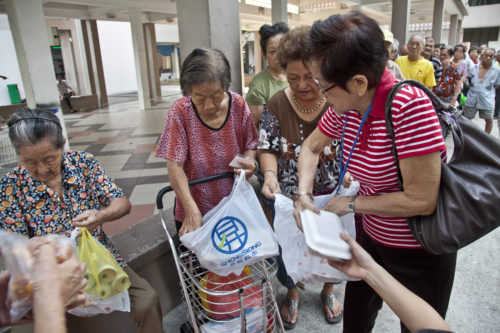
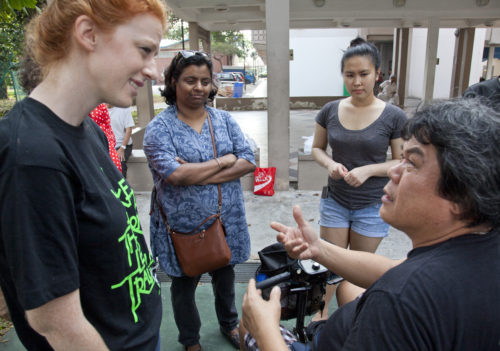
The Voice of Hope – Remembering the past and Recrafting the future
The Center for Culture-Centered Approach to Research and Evaluation (CARE), a research center under the Department of Communications and New Media at the National University of Singapore, is launching an online campaign on the 4th July to co-create stories of resilience, hope, and healing with the survivors of the Indonesian mass killings of 1965/1966. Based on scripts created by community members, the campaign seeks to create a narrative entry point for articulating the lived of experiences of sufferings and the pathways of hope. This online campaign titled “Learning65” celebrates the possibilities of hope amid suffering. Voices of hope come in various forms of stories and articulate the human rights, health and wellbeing issues faced by the survivors of the mass killings. After more than 50 years, the community members struggle to fight for justice amid the human rights violations under the New Order regime, which included mass killings, forced disappearances, sexual harassment, forced labor, imprisonment without trial, and many others. Community members share experiences of trauma, recounting physical torture, sexual harassment, and ongoing stigma. Voices of the victims have been systematically erased from the discursive space.
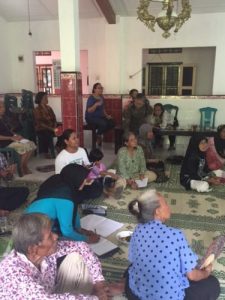
This online campaign was conceptualized by an advisory committee comprising 10 men and women from the community of 1965 survivors. Guided by the tenets of the culture-centered approach (CCA) pioneered by Center Director, Professor Mohan J. Dutta, this research study began with the understanding that community members are their own best problem configurations and solution providers. Therefore, when spaces for listening are created and communities are invited as co-participants, solutions to their health and well-being emerge from their lived contexts offering entry points for addressing trauma and suffering.
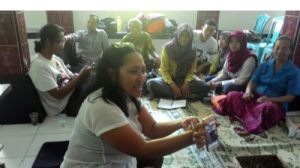
Over the 8 month-period, the advisory board identified key issues faced by the community of survivors and developed communicative solutions to tackle these problems. Stigma, restrictions to gather and to express thoughts, inequality, and communicative inaccess, are some of the problems that the community members face in their everyday lives. In collaboration with the NUS research team, the advisory board designed the campaign and the key messages in the collaterals. The media campaign developed by the community will include a dedicated digital story telling website, social media outreach, and a documentary research film.
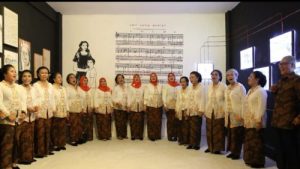
Besides the media campaign, the advisory committee also highlighted that a key element in building collective consciousness about the history and the 1965 tragedy, and enacting positive changes in their lives was to engage with the key stakeholders in solution-making. In line with this, two focus group discussions and peer leader meetings were organized, bringing together the younger generations, volunteers, artists, scholars, and activists. The community highlights the importance to engage with the younger generations through arts and performance to battle the stigma, and to address the erasures experienced by the victims and their family members for more than 50 years. The outcomes of the discussion and the solutions proposed will be summarized in two White Papers. The culture-centered campaign foregrounds voices of the the marginalized community of 1965 in creating a narrative entry point for health and wellbeing. The full White Paper will be available online at: http://www/care-cca.com/. To find out more about culture-centered approach, please visit http://www/care-cca.com/ CONTACT INFORMATION: Prof Mohan J. Dutta (cnmhead@nus.edu.sg) Dr. Dyah Pitaloka (cnmpd@nus.edu.sg)/ (itareksodirdjo@gmail.com)
Prof. Mohan J. Dutta receives the 2015 ICA Applied/Public Policy Research Award
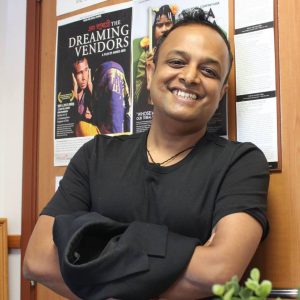
Professor Mohan J Dutta has received the 2015 International Communication Association (ICA) Applied/Public Policy Research Award. This award honors a scholar or group of researchers who have produced a systematic body of research in communication studying a particular applied or policy problem for the betterment of society. The award is a recognition of Prof. Dutta’s decade-long collaborations with marginalized communities in developing the culture-centered approach as a framework for addressing needs voiced by members of marginalized communities, for developing participatory processes for structural transformation through grassroots-driven advocacy, for fostering communication infrastructures for listening to community voices, and for co-constructing knowledge claims from the global margins. Under the umbrella of the Center for Culture-Centered Approach to Research and Evaluation (CARE) that he directs at NUS, Dutta has developed partnerships with communities that work toward addressing locally articulated and contextually constituted solutions such as building cultural resources of health and wellbeing, building healthcare services, building locally-based agricultural systems rooted in indigenous knowledge, developing culturally-centered communication campaigns, and creating policy advocacy tools that center the voices of marginalized community members in policy spaces.
[2 Talks and A Workshop] Dr Shaunak Sastry and Dr Zhuo Ban
We are excited to have Dr Shaunak Sastry and Dr Zhuo Ban with us this week and we would like invite you to their talks and workshop. Please see the details of the speakers, talks and workshop below. See you there!
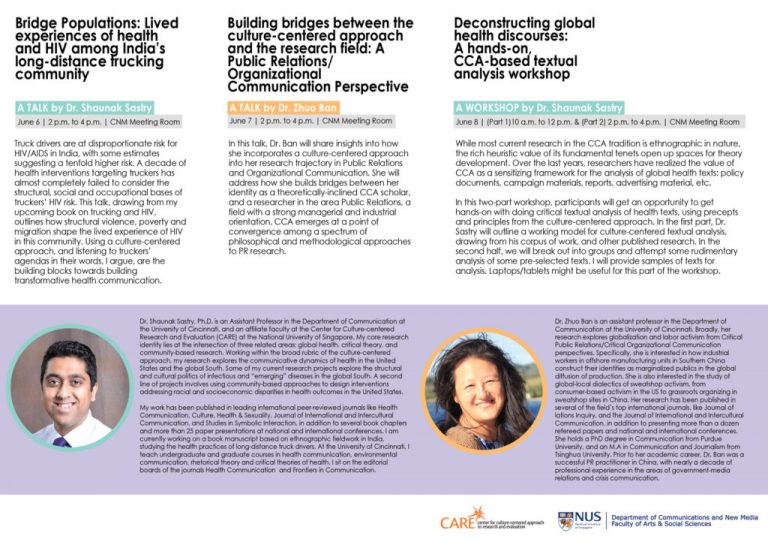
[CARE Documentary Screening] “Cotton for my Shroud” by Kavita Bahl and Nandan Saxena
Join us for the screening of an award-winning documentary film, Cotton for my Shroud, by Kavita Bahl and Nandan Saxena on 1 June (Wednesday), from 2.00 – 4.30 pm, at the CNM Playroom. This event includes the film screening, followed by a Question and Answer session with the filmmakers. The film focuses on the farmer suicide crisis in India, situating this within the wider neoliberal context of governance in India that has shaped the agricultural industry. If you are interested in attending this event, do register at the following link: http://goo.gl/forms/KTSgiu0w0hWXTgSA3 See you there!
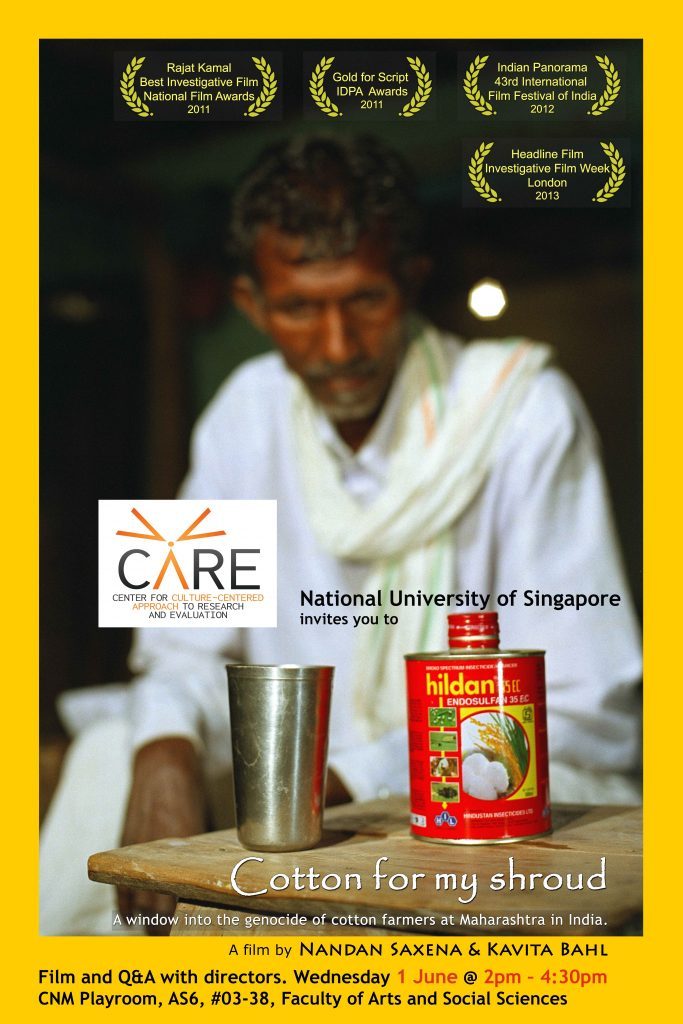
Archived White Papers
2016
VOL 2. (APRIL 2016) Dutta, et al., (2016). Culture-Centered Method: The nuts and bolts of co-creating communication infrastructures of listening in communities. CARE White Paper Series, 2 New! Dutta, et al., (2016). Metode-Berbasis Budaya. Culture-Centered Method: The nuts and bolts of co-creating communication infrastructures of listening in communities in Bahasa Indonesia. CARE White Paper Series, 2
VOL 1. (APRIL 2016) Dutta, M., Tan, M., & Rathina-Pandi. (2016). Singaporeans Left Behind: A Culture-Centered Study of the Poverty Experience in Singapore. CARE White Paper Series, 1 New!
2015
VOL 1. (JUNE 2015) Dutta, M. (2015). Food Insecurity and Health of Bangladeshi Workers in Singapore: A Culture-Centered Study. CARE White Paper Series, 1.
2014
VOL 2. (OCT 2014) Dutta, M., Kaur, S. & Comer, S. (2014). “Respect our Rights” – Voices of Foreign Domestic Workers Negotiating Structures. CARE White Paper Series, 2.
VOL 2. (FEB 2014) Teo, D., & Dutta, M. (2014). HIV Prevention Among Men Who Have Sex With Men: A culturally-centered framework for interventions. CARE White Paper Series, 2.
VOL 1. (FEB 2014) Dutta, M., Thaker, J., & Abid, A. (2014). Bt brinjal: A review of key debates. CARE White Paper Series, 1. VOL 1. (FEB 2014) Thaker, J., & Dutta, M. (2014). Bt cotton, scientific studies, and power circuits: Culturally-centering science. CARE White Paper Series, 1.
2013
VOL 1. (MAR 2013) Comer, S., & Dutta, M. (2013). Women’s heart health in Singapore: A culture-centered framework. CARE White Paper Series, 1.
2012
VOL. 1 (AUG 2012) Dutta, M. (2012). A cross-sectional survey of public opinion toward Affordable Care Act in Indiana. CARE White Paper Series, 1. Dutta, M. (2012). US public opinion on healthcare reform: A cross-sectional survey. CARE White Paper Series, 1.
Fortifying Migrant Workers in Singapore
With our “Respect Our Food Rights” campaign launched last year, we partnered with DSM and BOP Hub to address the micronutrient deficiencies faced by our Migrant Construction Workers in Singapore due to the poor quality meals they received. This video below showcases the soft launch of the ‘45Rice’ project in delivering micronutrient-rich rice to this migrant community and eventually the wider public at large in Singapore. The concept of “Hidden Hunger” is introduced and they addressed the issue through the strategy of producing and supplying this micronutrient-rich rice. Our Director, Prof Mohan Dutta, was present to give his insights about the event and the fortified rice that was served.

